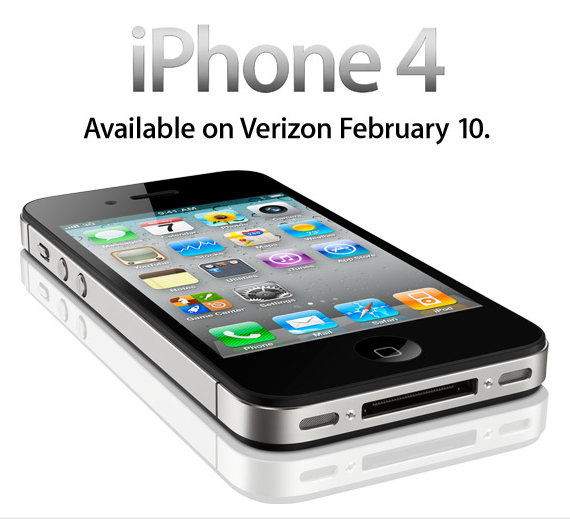Verizon iPhone with Personal Hotspot due Feb 10 (updated)


Verizon Wireless used New York as the backdrop to announce a new iPhone running on the company's CDMA network in a multi-year, non-exclusive deal with Apple.
Verizon has been working with Apple on the new iPhone for the last two years. In 2008 the two companies began talking about bringing the iPhone to Verizon's CDMA network and then they spent a year testing the new device.
From Apple's press release:
“Verizon Wireless customers have told us they can't wait to get their hands on iPhone 4, and we think they are going to love it,” said Tim Cook, Apple’s chief operating officer. “We have enormous respect for the company Verizon has built and the loyalty they have earned from their customers.”
The Verizon iPhone is basically the same as the current (GSM) iPhone 4 available from Apple and AT&T and has the same core feature set: Apple's A4 processor, Retina Display, FaceTime, 5 megapixel camera with LED flash, HD video recording and a a 3-axis gyroscope.
The change, of course, is the addition of the CDMA radio to support VZW bands. Unfortunately, Verizon has confirmed that CDMA's long-standing achilles heel -- it's inability to access the Internet and use the phone at the same time -- will carry over to the Verizon iPhone.
When Apple's Tim Cook was asked if any changes have been made to the antenna, he replied "We had to make changes to work on the CDMA network -- it's going to work great."
Aha.
MacRumors notes that the Verizon iPhone antenna was re-designed:
The new antenna design was leaked in an early video that was later removed by Apple. The new design has moved the antenna break position from the top to the sides of the device. The change may simply be to accommodate CDMA's different communication frequency rather than address the antenna issue from the original design.
When asked about why Verizon didn't go with LTE on its iPhone, Tim Cook replied:
Two reasons -- the first gen LTW chipsets force design changes we wouldn't make. And Verizon customers told us they want the iPhone now. I can't tell you the number of times we've been asked 'when will it work on Verizon.'
Another difference over the AT&T/GSM iPhone is that the Verizon version will ship with new "Personal Hotspot capabilities" which will share its 3G connection with up to five devices simultaneously.
Engadget reports in its hands-on that Personal Hotspot is built right into the CDMA iPhone 4's build of iOS 4.2.5, noting "Perhaps we'll see it migrate to other devices as well?"
Unfortunately Verizon didn't announce pricing for its iPhone data plans, so it remains to be seen if it will indeed offer unlimited data plans on its iPhones -- as was widely-rumored.
Breaking: Andy Ihnatko reports on TWiT that the Verizon will indeed offer an unlimited data plan for $30 per month with no data cap. This is still considered unconfirmed until I hear it directly from VZW.
VZW has posted an FAQ (which is slammed at the moment), a Learn More page (which looks like it was lifted directly from Apple.com), a Getting Ready Guide and an upgrade eligibility tool for existing VZW subscribers.
Prices will be the same as the GSM version, with Verizon charging $199 (16GB) and $299 for (32GB) respectively - with a two-year contract. The Verizon iPhone will be available for pre-order to current Verizon Wireless customers on February 3 and to everyone else on February 10.
Apple.com has been updated with a giant Verizon iPhone splash page (pictured above) and matching press release.
Personally, I'm thrilled and can't wait to get a Verizon iPhone because AT&T coverage is mediocre (at best) and VZW rocks -- at least where where I live in southern NJ.
Update: Engadget reports that the Verizon iPhone has relocated buttons, specifically the mute and volume buttons, and that it might require new cases.
So, are you buying one? What do you think the data plans will cost?
Photo: Engadget